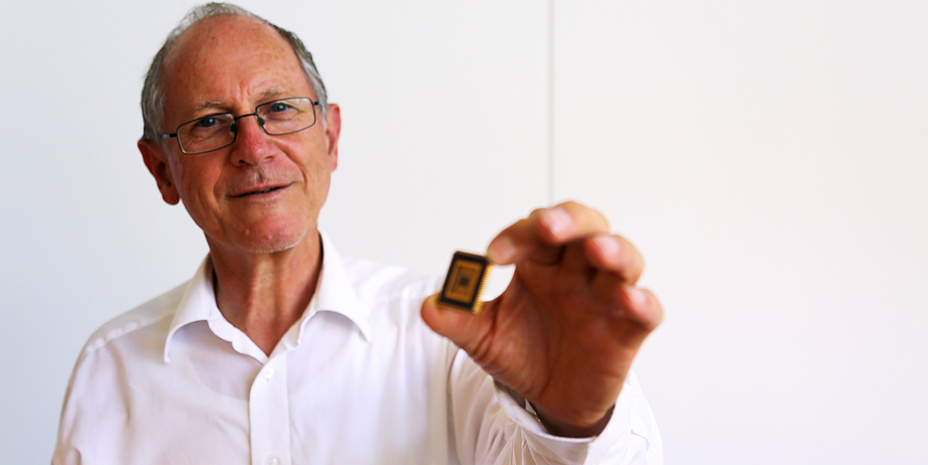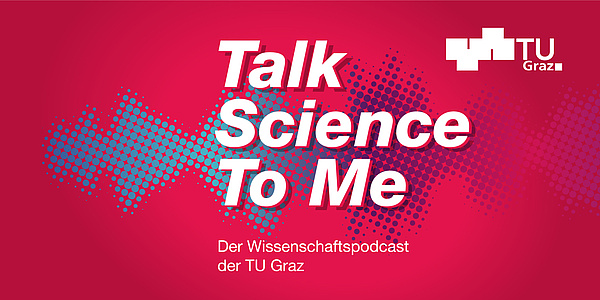Reinhard Posch sits with a blank notepad and black ball-point in his hands at the conference table in his office at TU Graz’s Campus Inffeldgasse. On the first page he has made small doodles in blue ink – not exactly what you would expect from a high-ranking computer science expert. The content of the interview, however, points in a direction which hints at the extensive knowledge, the various professional stations and the enthusiasm of this man.
News+Stories: What led you to TU Graz?
Reinhard Posch: I’ve been here for ages (laughs). I studied mechanical engineering here because at that time in Graz there wasn’t even a mathematics study programme. But I changed over as soon as this changed. Back then, people thought mathematics was less regulated than mechanical engineering, which for me was a bit like being at school. Mathematics was supposed to be freer. Later I decided to follow the information technology branch of studies and entered computer science almost by accident.
Back then, people thought mathematics was less regulated than mechanical engineering, which for me was a bit like being at school. Mathematics was supposed to be freer.
I worked in a computer centre in road construction and in those days we were the first people to implement IT in road building – that continued up to 3D planning. I became interested in operating systems very quickly. There was a huge system changeover and I said right at the beginning that the preferred system would not work with the desired installation. And it didn’t. I then built a device from common, commercially available components which provided the necessary performance and the company was impressed. I’ve often done that (laughs).
You are one of the founders of computer science at TU Graz.
Reinhard Posch: Yes. I was even present at the discussion about whether we should offer computer science at all. Together with Professor Hermann Maurer, I designed and started up the former telematics study programme. I like the close connection between electrical engineering and the natural sciences. At first there was only one institute, but then it was split up due to the huge size. We (note: <link https: www.iaik.tugraz.at _blank int-link-external external link in new>Institute of Applied Information Processing and Communication Technology) quickly decided to concentrate on security and encryption. Early on we dealt intensively with hardware implementation of cryptography and worked together with renowned companies.
How did you come to focus on this?
Reinhard Posch: It came about through an informal chat with a colleague from Canada – Paul Gillard – and just developed from that. Some things just happen.
Some things just happen.
We also entered into European research very early on and were one of the first institutes at TU Graz to apply for EU programmes and grants. This is still an important pillar today.
On top of your activities at TU Graz, you’re also the Chief Information Officer to the Austrian government. How did that happen?
Reinhard Posch: In 2000 I really bit off more than I could chew (laughs). There was an analysis of an implementation of a IT system which had been ordered by the federal government. I was asked to give my opinion as an expert on the resulting proposal. My answer was: “This would work in the private sector but not in the public sector.” People took me at my word – if I was so big on talk, then I should implement it myself. I had conceived a system but wanted someone else to implement and manage it. But the Chancellor at the time said: “Since it’s your idea, you should implement it.” And that’s what happened. In 2001 I was invited to a meeting of the ministerial council at the Chancellor’s Office and asked if I would accept the position of CIO. A committee headed by myself coordinates the IT plans of the various federal states and ministries to ensure that they don’t all end up producing different things. And I think this was achieved very elegantly. In the field of eGovernment we managed to put ourselves in first place among the former 15 member states EU-wide – today of course the evaluation criteria are different and we will have to improve ourselves again.
Since it’s your idea, you should implement it.
We established the A-SIT association. Due to the necessary independence, the committee decided to establish an association instead of a governmental department to give advice in matters of security, eSignatures and payment transactions and to which all public and private organisations can turn. Our aim is to design innovative concepts. For instance, the system behind the cash registers of TU Graz was developed in the framework of A-SIT..
To what extent does your work change when there is a new government?
Reinhard Posch: It doesn’t change at all. We agreed right at the beginning that our internal occupancy periods do not coincide with those in politics. This means that a new government does not determine a new programme, and our continuity is ensured. As CIO I’m not assigned to any ministry hierarchy, but rather just report back to the Chancellor and Vice-Chancellor, who usually come from different parties. This ensures a certain neutrality.
We agreed right at the beginning that our internal occupancy periods do not coincide with those in politics.
What are currently the biggest challenges?
Reinhard Posch: In eGovernment it’s the coordination of strategic elements with the overall picture. As well as the “not invented here“ (Note: when systems are purchased), which leads to each ministry working differently. The ministries are completely autonomous, as in the past, and have committed themselves voluntarily to work together. The challenge is not finding the most efficient variant, but rather finding a form which works with all of them. The many different levels are also difficult – federal states, councils, social insurance.
Digitalisation is a big important topic at universities, too. As a university, what challenges do we face?
Reinhard Posch: Digitalisation and cloud computing, etc. are not ends in themselves, but rather a contribution to facilitate internationalisation of teaching and research, and to increase administrative efficiency. In daily business with the often conservative structures, this aspect often doesn’t get the attention it deserves. TU Graz has publicly stated that it is pushing ahead with digitalisation, and with support from the ministry is pursuing the aim of becoming a flagship university in Austria. The experience of the CIO of the federal government could prove to be very helpful.
Digitalisation and cloud computing, etc. are not ends in themselves, but rather a contribution to facilitate internationalisation of teaching and research, and to increase administrative efficiency.
Reinhard POSCH
O.Univ.-Prpf. Dipl.-Ing. Dr.techn.
Institute of Applied Information Processing and Communication Technology
Inffeldgasse 16a/II
8010 Graz
Phone: +43 316 873 5510
<link int-link-mail window for sending>reinhard.posch@iaik.tugraz.at


![[Translate to Englisch:]](https://www.tugraz.at/fileadmin/_processed_/9/8/csm_banner-thek-by-privat_a42f57f7b3.jpg)


